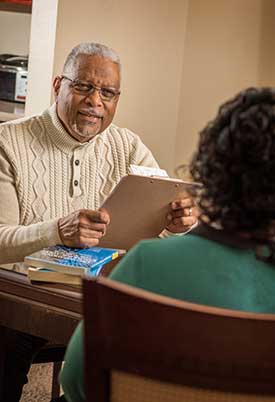
Dr. Velma Layne meets a lot of veterans in his job at the Huntington, West Virginia, Veterans Administration (VA) Medical Center. From time to time, word gets around that he conducts research in his spare time about veterans pursuing higher education. “One veteran recently told me he had started college three times but just couldn’t seem to finish his degree,” says Layne, a 2016 Doctor of Education (EdD) graduate. “He had heard that I help veterans get the support they need to finish school and was hoping I could help him, too.”
Providing that support to veterans is a passion for Layne. “Too many veterans start school and then drop out as a result of the effects of war: post-traumatic stress disorder, brain injuries, loss of limbs, or trouble getting their GI Bill benefits,” he says. “But getting a college degree is one of the keys to being able to get a job that allows them to support their families and build a career.”
As the VA’s minority veterans programs coordinator, the former U.S. Navy fighter jet mechanic saw how veterans struggled to get the education they needed. But in that role, there was only so much he could do to help.
Layne decided to pursue his EdD so he could build a support system that bridged the gap in services. During his doctoral literature review, Layne discovered a deep disconnect between veterans’ needs and the expectations and assumptions of college administrators and faculty.
“Most people in academia haven’t seen the world from a veteran’s perspective,” Layne says. “One veteran I worked with walked out of a history class because a war image the professor showed triggered a flashback. He could never bring himself to go back to class, so he failed.
“Those sensitivities aren’t usually on a professor’s radar,” Layne says. “One professor I interviewed said veterans should leave the war behind and focus on being traditional students. That shows exactly how wide the divide between the professor’s expectation and the veteran’s reality is.”
Inspired by Walden’s mission of positive social change, Layne developed a program that brings educators and veterans face to face to discuss the issues surrounding the transition from soldier to student.
Veterans share the challenges of entering the role of student, and educators learn about the support veterans need to succeed in the classroom. Layne also works one-on-one with veterans to help them access the services they need, whether that’s tutoring, referrals to mental healthcare providers, or assistance applying for GI Bill benefits.
He gets the word out about the program, which he works on entirely on his own time, through his website, SupportingMilitaryVeterans.com. His job at the VA also brings him in contact with veterans of all ages who may be seeking help.
“My Walden education gave me the scholarly tools, confidence, and credibility to make a difference in the lives of the men and women who serve our country,” Layne says. “Their sincere thanks is all the recognition I need.”



